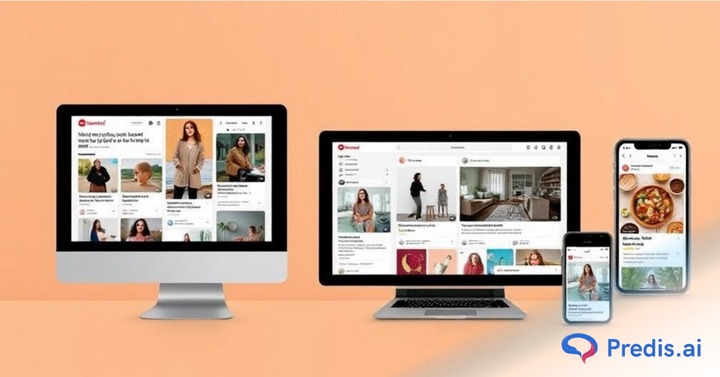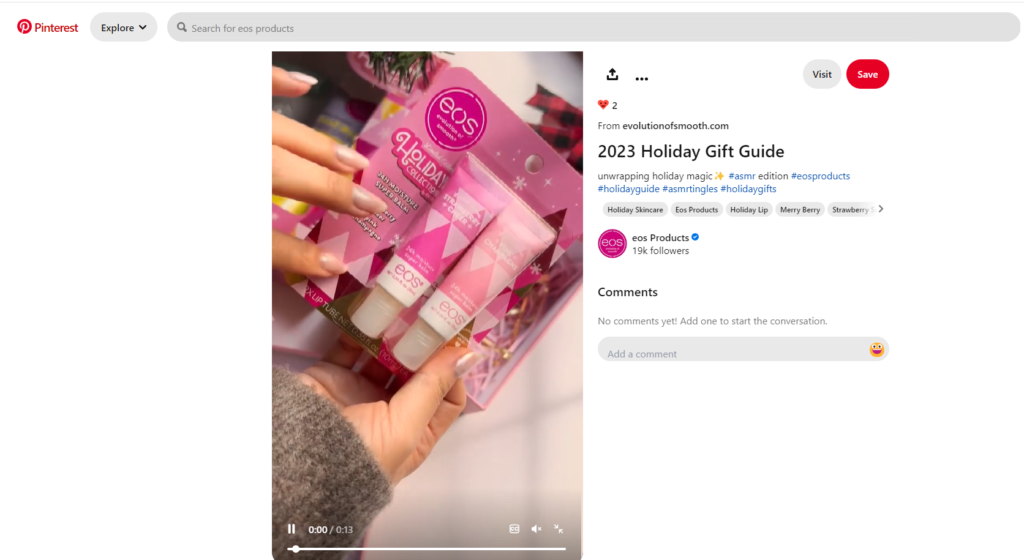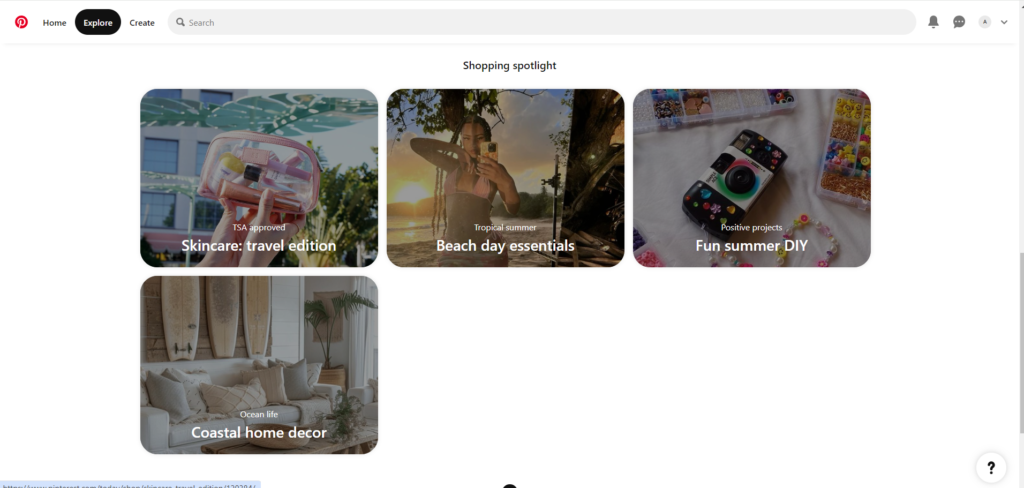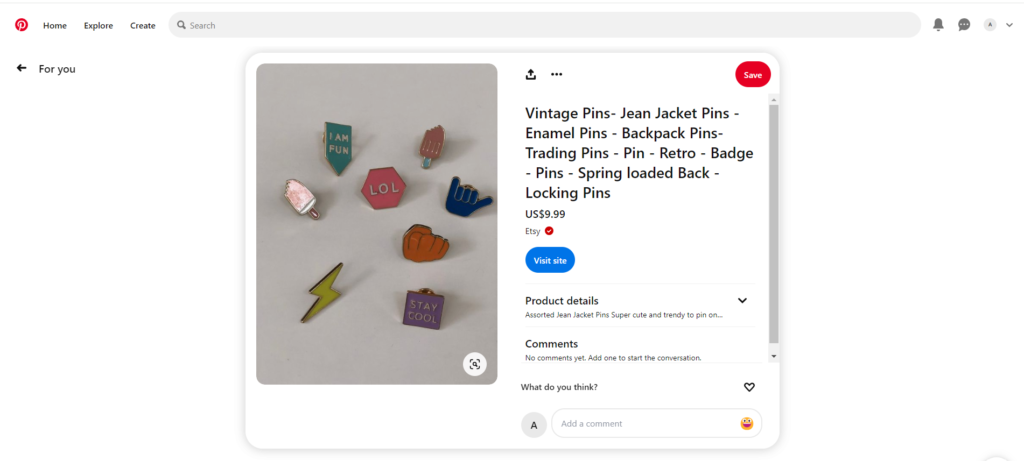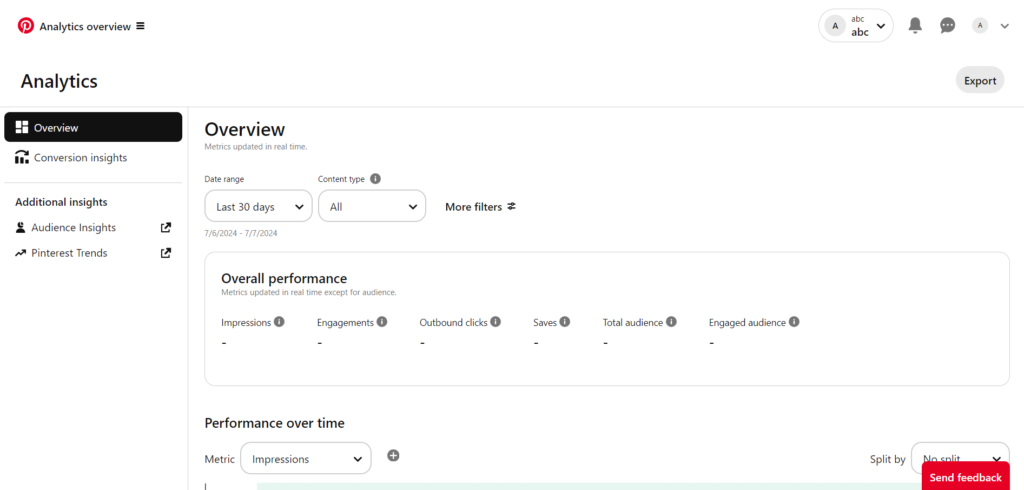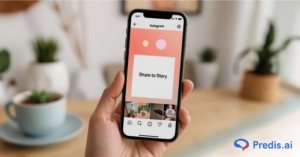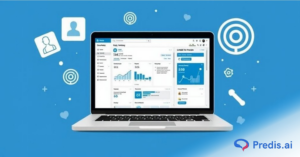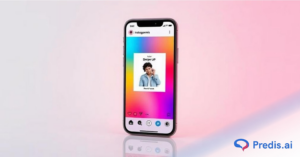Imagine scrolling through a visual wonderland where every pin entices the eye and strategically grows your business. Want to explore a range of top Pinterest Ad examples that have captured hearts and wallets?
Welcome to Pinterest, a dynamic platform at the forefront of social media marketing, serving over 518 million monthly active users with content that inspires, informs, and influences their buying decisions. Pinterest goes way beyond just pretty pictures, making it one of the best ways for businesses to connect with their audience.
Be ready to be inspired by an ocean of creativity and success through these inventive Pinterest ad campaigns. Read on!
Understanding Pinterest Ads
Did you know that more than 85% of weekly Pinterest users make purchases based on Pins they see from brands? Pinterest ads are a goldmine for businesses looking to capture the attention of visually oriented consumers.
The effectiveness of Pinterest advertising is thus a consequence of how it achieves two things: first, it can attract viewers, and second, it engages them through subtle yet substantial means. Since users arrive at Pinterest in a state of seeking inspiration, this makes it an excellent platform for brands to provide solutions through crafted advertisements.
When trying to launch a new product or maximize the potential of your current one, Pinterest ads will provide an excellent advantage for increased visibility and engagement.
Types Of Pinterest Ads
The key to making the best use of Pinterest is understanding the variety of ad formats available. Pinterest has several formats aimed at catering to the various needs of marketers. All are designed in such a way that they align with the user’s browsing experience.
Here are the major types of Pinterest ads:
1. Promoted Pins
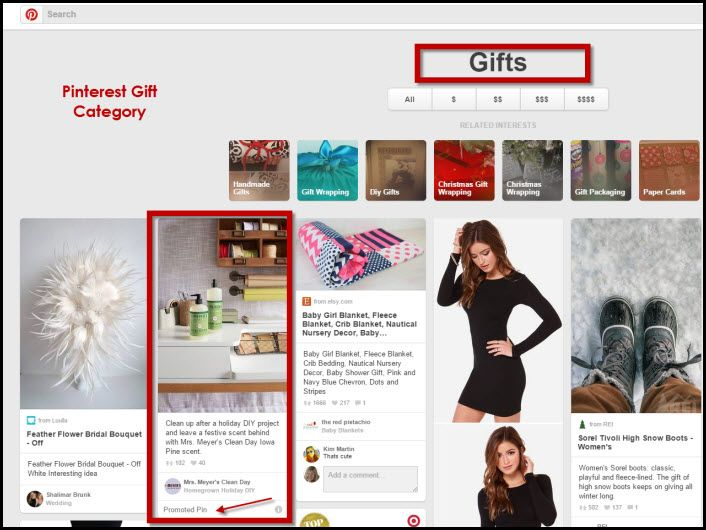
These are basically regular pins on the website that a business pays to expose to a broader audience. In form and usability, they look like regular pins but have a much greater reach. Promoted Pins can be effective for bringing clicks directly to your landing page.
2. Carousel Ads
In carousel ads, multiple images are displayed in one advertisement. When a viewer goes through it, they swipe for different images, each with its own link. This format best suits explaining a deeper story about your brand, showcasing various product features, or taking people through a step-by-step process.
3. Video Pins
Video Pins capture attention quickly, playing automatically as users scroll through their feeds. They are especially powerful for increasing brand awareness and engagement, with Pinterest data showing that video content is 2.6 times more likely to make viewers make a purchase.
4. Premiere Spotlight
This offers premium placement at the very top of the Pinterest search page for maximum visibility. It’s perfect for extensive, splashy campaigns that drive brand awareness and reach large audiences quickly.
5. Shopping Pins
Shopping Pins enable users to shop without leaving Pinterest. These pins feature pricing and product details and link directly to the retailer’s website. They are highly effective for driving e-commerce sales and reaching users with high purchase intent.
6. Collections Ads
Collections ads feature a hero image or video with several smaller, related images underneath. Users can tap to view and shop for items directly within the Pinterest app. This format is excellent for showcasing a range of products or a cohesive collection.
7. Showcase Ads
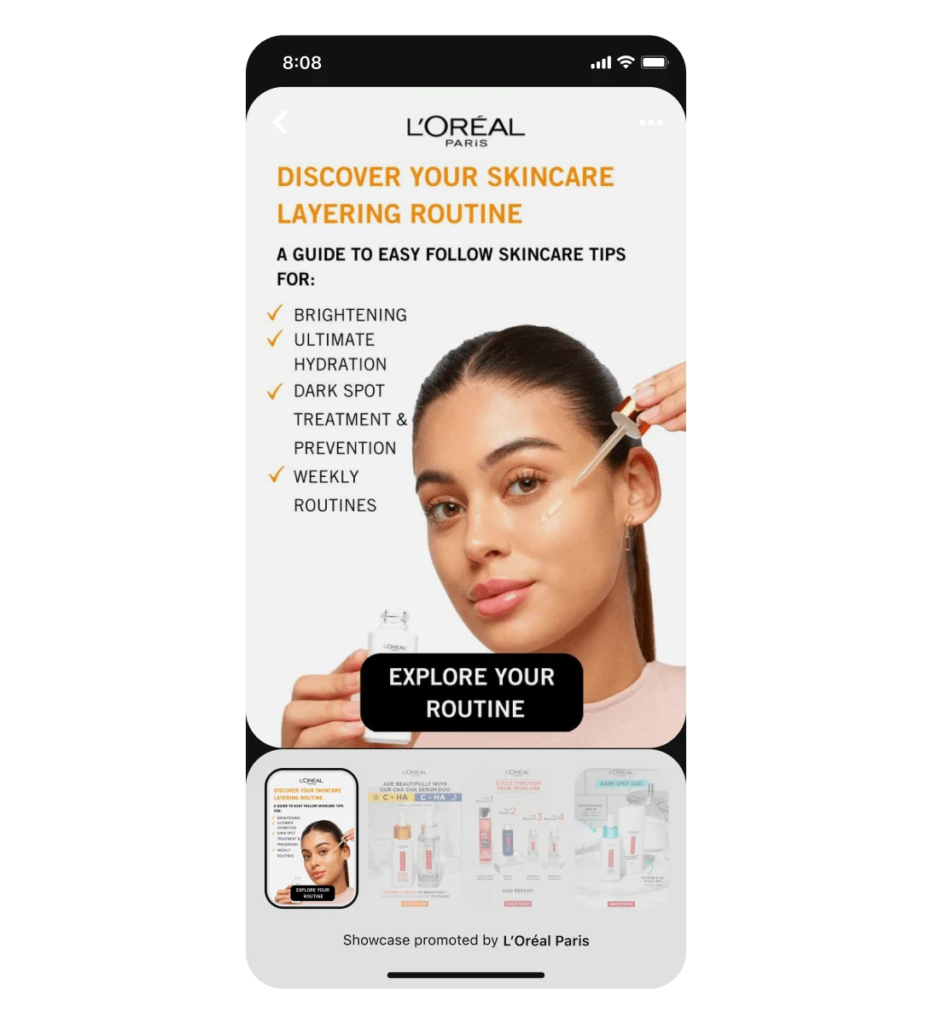
These ads are designed to showcase many products or services in just one ad. Businesses can show an assortment of offerings in showcase ads. This makes it easy for users to discover and explore several options from one brand.
Creating Visually Appealing Pinterest Ads
Creating visually appealing Pinterest ads is a crucial step. Here’s why visuals are so impactful in Pinterest ads:
- Immediate Impact: Visuals are the first element that viewers notice. A well-designed ad can boost intent among users who engage with video content. The right visual can transform passive viewers into active engagers.
- Brand Consistency: Using a similar look and feel in your advertisements creates better brand recognition and trust. It helps users recognize your products and build long-term trust.
Tips for Designing Eye-Catching Pinterest Ads:
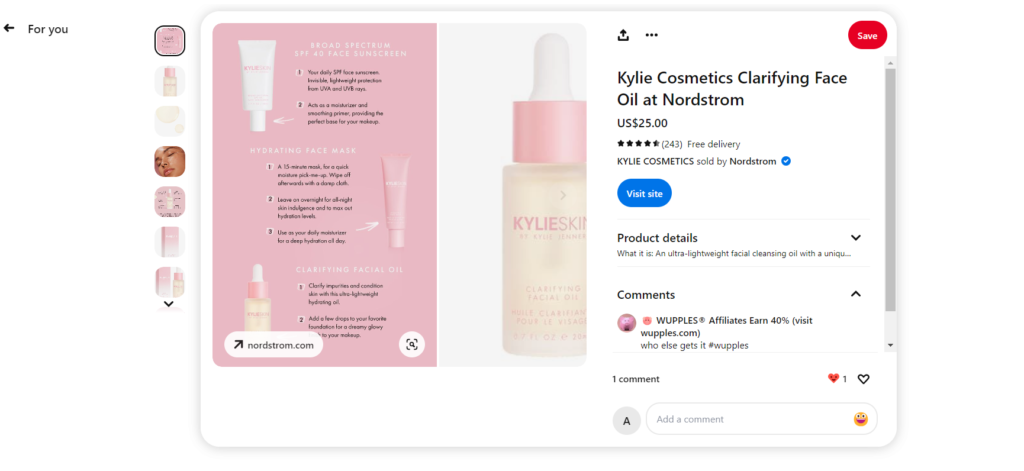
Effective strategies for designing Pinterest ads that attract and convert include:
- Optimize Aspect Ratios: Use a 2:3 aspect ratio for standard pins. Pinterest suggests avoiding square or horizontal images, as they may lead to lower performance. This makes sure your ads look good in feeds, both on mobile and desktop.
- Focus on High-Quality Images: Use high-quality, high-resolution images to prevent pixelation that can affect the intended user experience. Clear and crisp visuals engage users much better, leading them into action.
- Incorporate Text Wisely: Overlay your images with text to deliver your message quickly, but ensure it doesn’t overshadow the visual appeal. Keep the text concise and readable. Strategic text placement can impact the message’s clarity and viewer engagement.
- Use Brand Colors: Incorporate your brand colors to make the ad instantly recognizable. This enhances brand identity and can improve ad recall. A consistent color palette helps to build a solid visual identity across the platform.
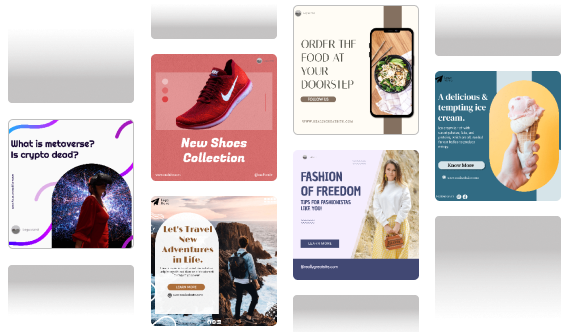
Targeting Your Audience on Pinterest
Making Pinterest work effectively to target audience at the highest possible level requires strategies that help you leverage the platform’s user base and search capabilities. Here’s how to adapt your advertising strategy to Pinterest users’ preferences and behaviors:
1. Demographic Targeting
Start defining your audience with key demographics like age range, location, gender, and language. On Pinterest, with its very diversified user base, you can pick which section best fits the brand.
2. Interest Targeting
The targeting options on Pinterest allow you to serve ads based on interests pinned because users actively pin their interests and aspirations. This ensures that your ads reach people with genuine interest in similar topics and maximize engagement.
3. Behavioral Targeting
Take advantage of Pinterest’s targeting tools based on past behaviors, such as activity pinning, purchase history, or previous ad interactions. Such ad relevance and value will benefit the viewer.
4. Keyword Targeting
Implement keyword targeting to connect your ads with users searching for related content. This strategy enhances visibility and drives relevant traffic to your pins.
5. Lookalike Audiences
Expand the reach of your ad to new people who are likely interested in your products or services because they are similar to your best current customers.
Top Pinterest Ad Examples
To provide a comprehensive overview with real-world Pinterest ad examples of successful, let’s analyze some campaigns that have truly set the standard for effective advertising on the platform.
This analysis will focus on what makes each campaign a success, highlighting aspects of design, messaging, and audience engagement.
1. Lowe’s “Fix in Six” Campaign
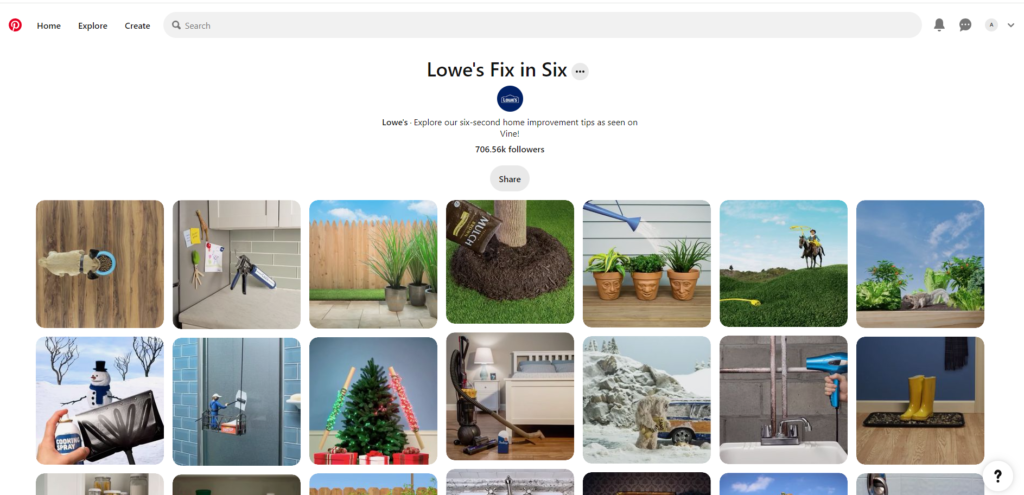
Lowe’s home improvement stores brilliantly utilized Video Pins in their “Fix in Six” series, offering quick DIY tips in less than six seconds. This campaign was particularly effective due to its educational and highly shareable content.
What made it effective:
- Engagement: The quick and useful tips provided immediate value, encouraging sharing and saving.
- Visuals: Simple yet informative visuals demonstrated DIY tips clearly and effectively.
- Brand Awareness: The campaign reinforced Lowe’s position as a helpful and accessible brand for home improvement needs.
2. Adidas Women’s “She Breaks Barriers” Campaign
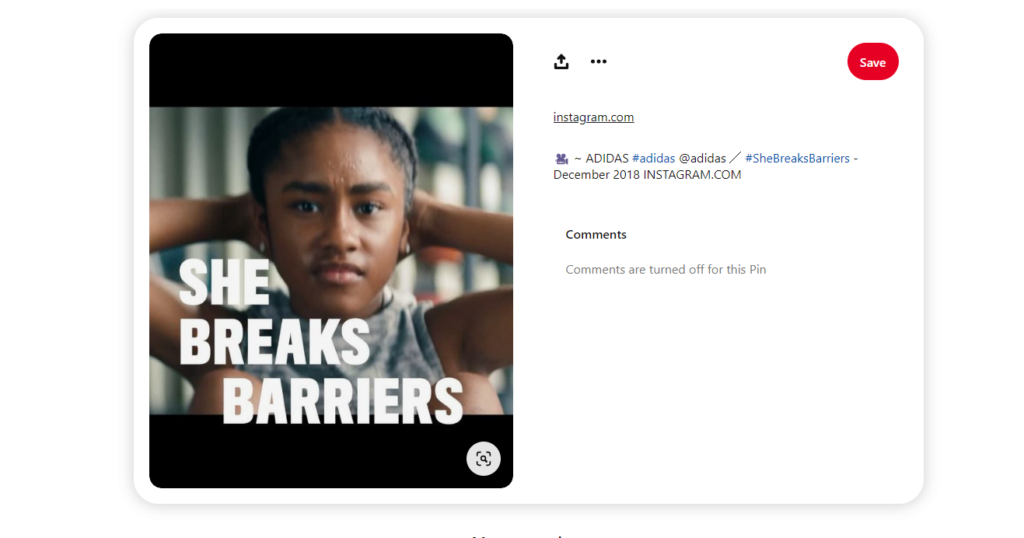
Adidas launched a powerful Promoted Video campaign targeting women athletes. The campaign featured inspiring stories of female athletes breaking stereotypes, resonating deeply with its target audience.
What made it effective:
- Empowering Message: The focus on women’s empowerment in sports created a strong emotional connection.
- Target Audience: As the campaign was based on women, it resonated effectively with the target market.
- Visual and Emotional Appeal: Good quality visual and robust content, as well as stories, provoked viewers’ emotions and consequently built brand loyalty.
3. BuzzFeed Tasty’s Recipe Pins
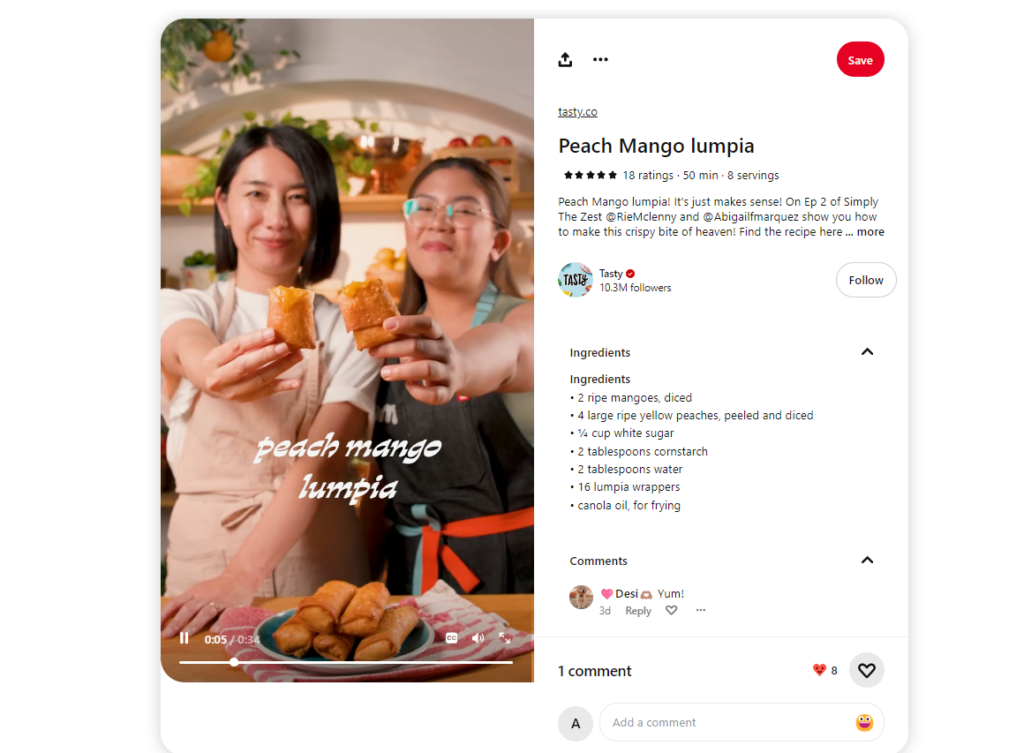
BuzzFeed has mastered the use of Recipe Pins. One often observes super interactive and visually appealing recipe videos on their Tasty channel, which gets much traffic to their website.
What made it effective:
- High Engagement: Tasty’s recipe videos are optimized for sharing and engaging with a Pinterest user.
- Driving Traffic: Every pin includes a URL that leads back to the complete recipe on BuzzFeed’s website, which drives further web traffic.
- Brand Recognition: This is maintained for their branding on pins, which builds up Tasty as a destination source for fast and tasty recipes
4. Wayfair’s Dynamic Retargeting Ads
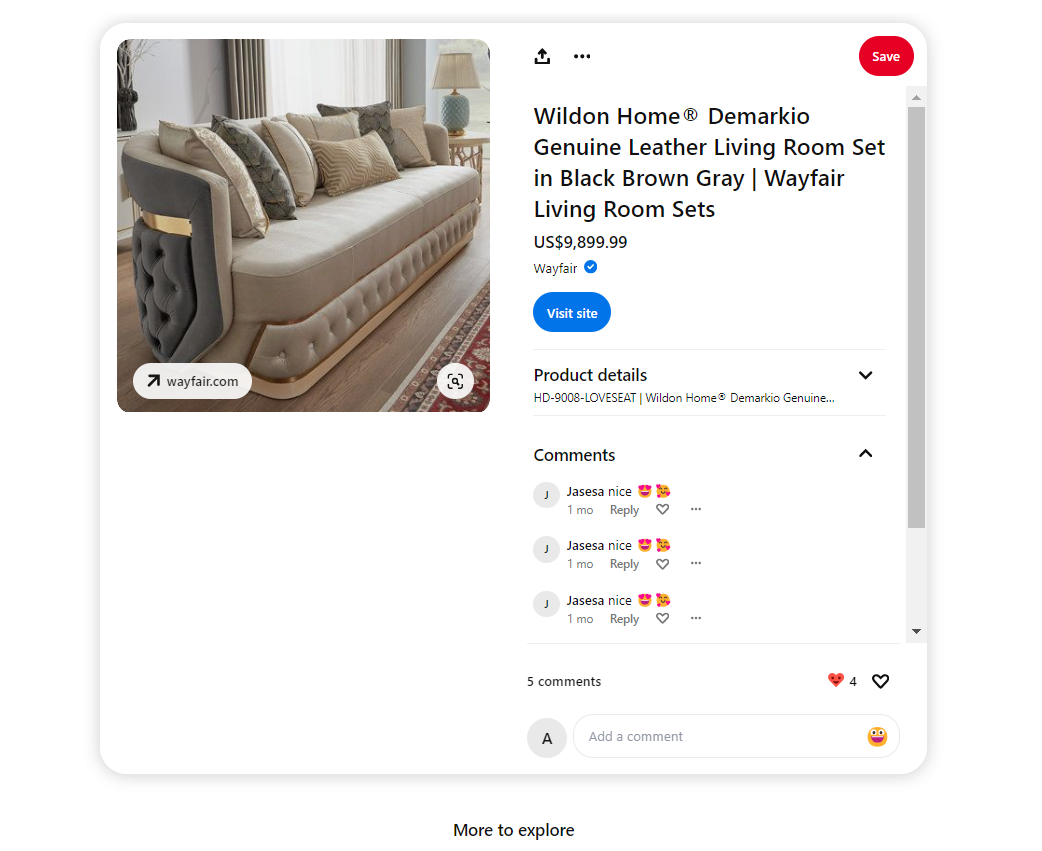
Wayfair uses dynamic retargeting to display relevant products to users who have visited their website before but have not purchased them. This serves the purpose of keeping such users in mind about the products they were looking at and what they left behind.
What made it one of the most effective Pinterest ad examples:
- Personalization: The ads are highly personalized, showing users products they are already interested in.
- Re-engagement: It seeks to re-engage customers on the Wayfair website, giving a higher chance for conversion.
- Visual Appeal: Product images are clear and attractive and, therefore, appeal to potential customers accordingly.
5. Nestle Tollhouse’s Holiday Campaign
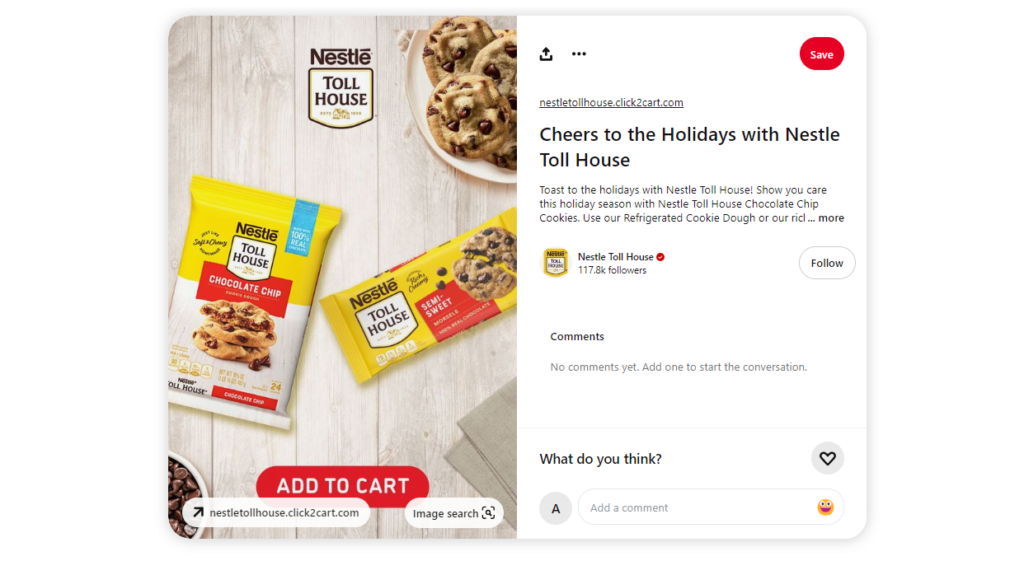
Nestle Tollhouse used a full-funnel approach to reach its market over the holiday season. The campaign started early, using Pinterest’s Trends tool to spot popular holiday baking searches and shape their recipe-focused advertisements.
What made it effective:
- Early Engagement: Ads went up in early fall to capture holiday interest.
- Targeted Content: The use of Pinterest Trends ensured the ads were relevant and timely.
- Effective CTAs: CTAs like “Make the recipe” and “Add to cart” boosted engagement and directed users to try recipes and make purchases.
6. L’Oreal Paris’ “Beauty Squad” Campaign
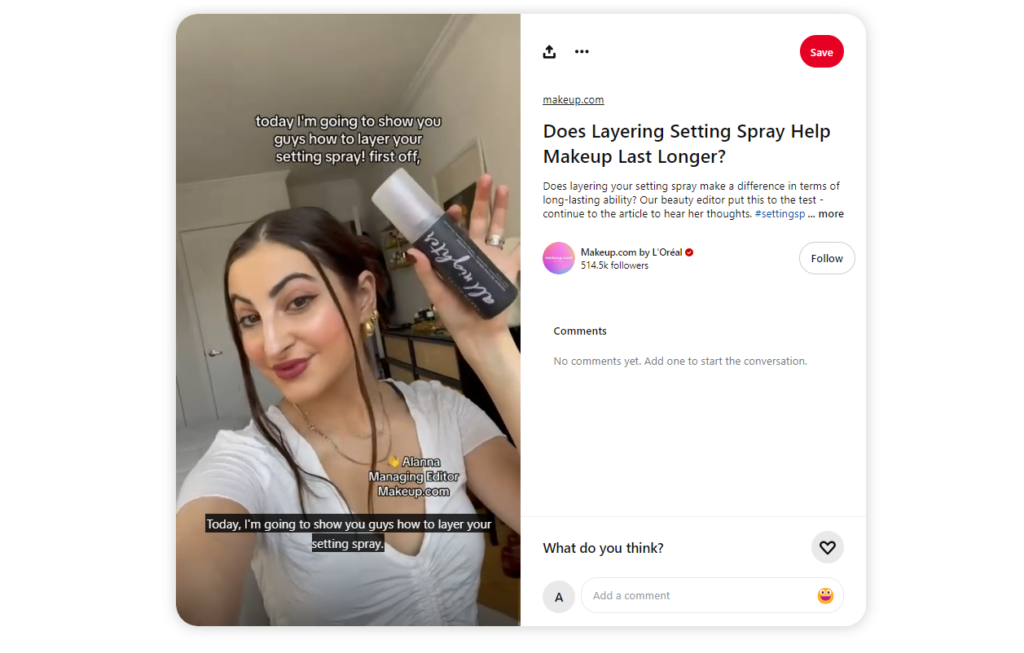
L’Oreal Paris launched the “Beauty Squad” campaign using a series of Promoted Video Pins that featured tutorials from beauty influencers and L’Oreal ambassadors. The videos showcased various beauty products and techniques, targeting beauty enthusiasts looking for new makeup tips and product recommendations.
Here’s what makes it effective:
- Content Relevance: The use of video content met Pinterest users’ demand for dynamic, instructional content that is easy to follow.
- Influencer Collaboration: L’Oreal could tap into its followers and credibility by partnering with popular beauty influencers. This enhanced the campaign’s reach and authenticity.
- Interactive Experience: The videos encouraged user interaction by inviting viewers to try the featured products and techniques themselves, effectively using Pinterest’s platform to engage users in a two-way conversation about beauty.
Use Predis.ai Pinterest Caption Generator to generate engaging hashtags that will not only optimize visibility but also encourage user interaction in the long run.
Lessons Learned from These Successful Pinterest Ads
Successful Pinterest ad examples provide strong hints about what a good overall strategy should be as businesses learn from crucial elements that make such campaigns convert successfully.
1. Deliver Value Quickly
Campaigns, like Lowe’s “Fix in Six,” are successful because value has been delivered to the viewer instantly. Rapid valuable tips or insights are created that capture users’ attention and encourage sharing. Ads providing instant solutions or information have more potential to grab users’ interest and drive some action.
2. Take Emotional Appeal
Campaigns like Adidas Women’s “She Breaks Barriers” showcase the power of emotional appeal. Advertisements that convey a compelling story or imbibe an important message find resonance with the viewers. They leave strong impressions and, therefore, build brand loyalty. In most cases, emotional attachment is a powerful driving force for more vital involvement and brand affinity.
3. Use High-Quality Images
Pinterest is hyper-visual. Having high-quality, highly engaging visual content, like BuzzFeed Tasty’s Recipe Pins, makes it easy for you to capture users’ attention and drive up engagement. If you’re investing in anything, it should be professional-grade images and videos for your brand and products.
4. Customize Content
Dynamic retargeting ads from Wayfair underline the level of success attributed to tailored content. As such, personalized ads can be created dynamically according to individual user preferences and past interactions to bring them back or to optimize conversions. To put it in short, personalized ads drive a relevant and more engaging user experience.
5. Effective Call-to-Actions
Nestle Tollhouse’s campaign demonstrated the power of effective CTAs. By incorporating clear and direct CTAs like “Make the recipe” and “Add to cart,” the campaign effectively guided users through the desired actions, increasing both engagement and sales. Well-placed CTAs can significantly enhance the performance of your Pinterest ads by prompting users to take immediate action.
6. Team Up with Influencers
Influencer partnerships, which L’Oréal enacted, can increase the credibility and span of your campaigns. Work with influencers who identify with your brand to tap into their follower base for more authenticity in your ads. Influencers can further amplify your message and help you achieve a higher engagement rate.
Designing Your Own Pinterest Ad Campaign
Designing a successful Pinterest ad campaign involves thoughtful planning and strategic execution. Here are the essential steps to conceptualize and launch an effective campaign on Pinterest inspired by real-world examples that have captivated audiences:
Step 1: Define Your Objectives
Start by defining the goals for your campaign. Are you interested in increasing brand awareness and generating leads to your website or product sales? An instance where L’Oreal Paris aimed at inspiring and educating the audience through its video tutorials for the “Beauty Squad,” this approach primarily addressed engagement and brand affinity.
Step 2: Know Your Audience
Understand your target demographic. Use the Pinterest analytics tools to measure the audience’s interests, behaviors, and preferences. This is similar to how Wayfair re-engages visitors with dynamic ads featuring products they looked at but didn’t buy.
Step 3: Create Compelling Content
Develop high-quality, visually appealing pins that align with audience interests and your objectives. Ensure that your pins use the optimal aspect ratio (2:3) for best performance. Buzzfeed’s Tasty uses this strategy by crafting engaging and visually appealing recipe videos.
Step 4: Search Optimization
Put relevant keywords in your description and title on your pin, which will boost visibility. Since Pinterest is like a search engine, you must employ proper SEO. The Adidas Women’s “She Breaks Barriers” campaign used targeted keywords to reach a particular group of people who would be interested in women’s athletics.
Step 5: Utilize the Right Ad Format
From a range of ad formats, choose what best suits the purpose of your campaign. For example, Promoted Pins from TopShop enable their target audience to be informed of the latest fashion trends.
Step 6: Set Up and Launch the Campaign
Set your budget, schedule your pins, and launch your campaign. Use Pinterest’s ad manager to monitor performance and make adjustments as needed.
Step 7: Measure and Adjust
Analyze metrics like impressions, clicks, and conversions to understand what’s working and what isn’t. Refine your strategy based on this data to optimize future campaigns.
Measuring the Success of Pinterest Ads
Pinterest Analytics provides comprehensive insights into all the crucial metrics directly on the platform. It allows advertisers to track their campaign performance and understand user interaction.
Here are the essential metrics to track for an effective campaign analysis:
- Impressions and Reach: Assess the number of times your ad was seen and how broadly it was distributed. This metric helps gauge brand awareness.
- Engagement Rate: Measures interactions such as repins, comments, and likes, reflecting viewer interest and content appeal.
- Click-Through Rate (CTR): This measures how many viewers clicked on your ad to visit the landing page. A high CTR indicates that your visual content and call-to-action are effective.
- Conversion Rate: The number of clicks that triggered the final desired action, like a sale or sign-up. This is a significant measure for analyzing ROI.
- Return on Ad Spend (ROAS): Calculate the revenue generated for every dollar spent on your ad. It’s essential for evaluating the profitability of your ad spend.
Conclusion
The exploration of successful Pinterest ad campaigns provides clear strategies for enhancing Pinterest advertising efforts. These examples highlight the effectiveness of high-quality visuals, targeted messaging, and strategic engagement to resonate with audiences.
Use these insights to enhance your Pinterest ad strategy. Ensure the visuals are engaging, align content with user interests, and then track engagement in refining the approach. Implementing these proven strategies will quickly increase your brand’s visibility and engagement on Pinterest, increasing traffic and conversions.
Use Predis.ai Ad Generator to elevate your brand’s visibility and drive conversions with compelling ads tailored for Pinterest.


